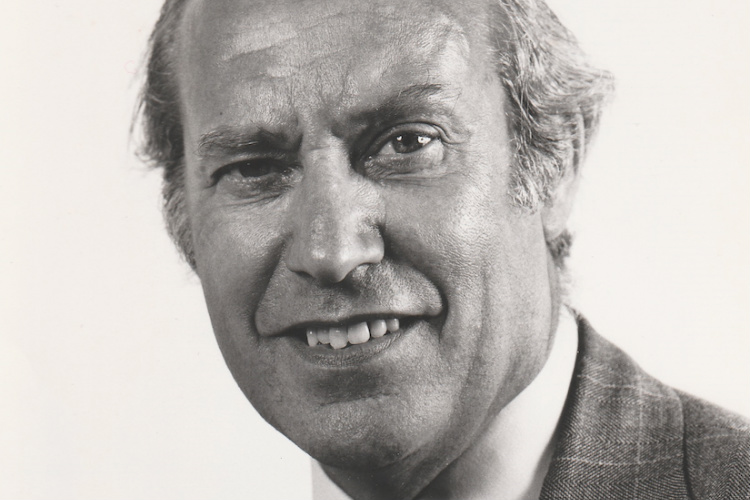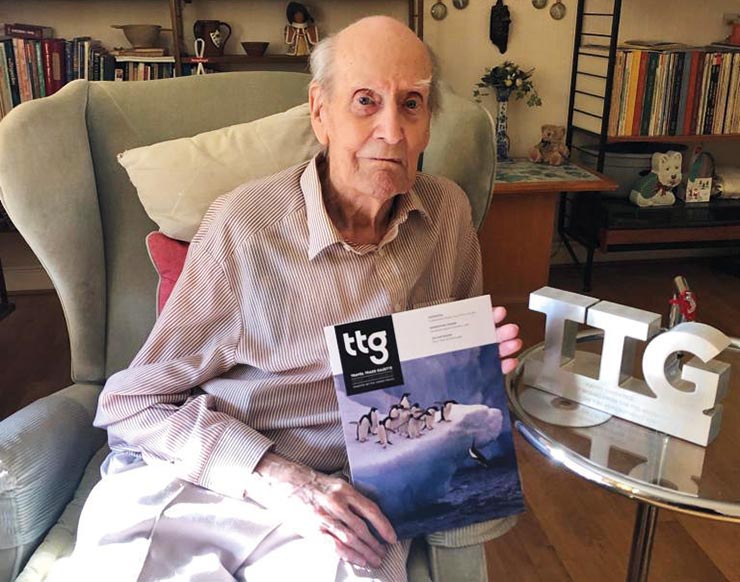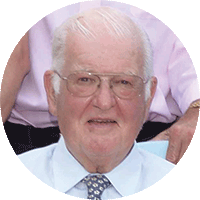Ted Kirkham: A farewell to our founding editor
Daniel Pearce recalls the life of Ted Kirkham, the founding editor of the Travel Trade Gazette, who passed away peacefully aged 100 earlier this month.
It was just after we landed in Split on the way to the ITT conference last Monday, 10 June, that the TTG Media team heard the news about Ted from his son, Graeme.
And how fitting our location was. As the founding editor of the Travel Trade Gazette in 1953, Albert Edward “Ted” Kirkham was at the forefront of travel conferences, and the travel industry at large, throughout the 1950s, 60s and 70s. I think he would have appreciated the toast we raised to him that evening in Croatia.
As Ted told me when I first met him in 2013, at the time of the 60th birthday of TTG, he and his business partner Leslie Stone had had precisely the same idea for a pioneering travel industry paper in the years following the Second World War, as outbound leisure travel from the UK was really taking off.
Leslie had been in the holiday advertisement department at The Daily Express before joining travel industry monthly Holiday World, while Ted was PR manager for the Polytechnic Touring Association. Both spotted the opportunity for a weekly publication that linked travel suppliers with travel agents. The first edition of the Travel Trade Gazette, the first weekly publication of its kind in the world, was born as a four-page newspaper on 21 March 1953.
“TTG is more than print and paper. It is a living thing, reflecting the character and philosophy of the people who create it – and the needs and attitudes of the people who read it”
“The printer demanded cash up front and predicted the paper wouldn’t last six weeks,” Ted recalled not so long ago. Fortunately, the printer was wrong and TTG has published virtually every week in the 66 years since.
Ted didn’t join TTG full-time until that November, as he needed to continue to take his wages from Poly before the money started rolling in for TTG. He had started his working life in the late 1930s in advertising, before war service with the Royal Artillery and the Royal Engineers.
Moving on to a newspaper in Brighton, his first taste of tourism was with the Brighton and Hove publicity department before he joined Poly, where in 1952 he was responsible for UK travel’s first-ever colour magazine, Poly Holiday News – the perfect grounding for the Travel Trade Gazette.
The growth of TTG in the 1950s, 60s and 70s, once Ted and Leslie had proven those printers wrong, is now the stuff of travel – and media – legend. The team were at the heart of every travel launch and every story during a period many would still call the “golden age of travel”.
As Ted commented in the pages of his unfinished autobiography: “I’m not sure I can pick out the biggest stories. Such was the significance and pace of events – nationally, internationally, on land, sea, in the air and in the political arena too – they were all big stories. We had front-row seats!
“Our aim was to be the first and best with the news. As a weekly – the only one in the world – it wasn’t difficult to be first. International travel and tourism activity, growing at an unprecedented pace, provided us with a non-stop flow of news. ‘New’ was the buzzword – new destinations, new aircraft, new ships, new routes, new operators, new package deals…”
Press releases cascaded into TTG’s tiny first office, above railway timetable publisher Bradshaws, in Surrey Street, just off the Strand in central London. Further tip-offs came from gatherings of the Skal Club, City Travel Club and the Travel Luncheon Club – still in existence today and recently incorporated into the ITT.
“My best-remembered expedition was the inaugural flight of Air France’s Eastern Epicurean service, London to Tokyo with stops in eight countries. Day-stays in Japan, the Philippines and the Lebanon provided material for several issues,” recalled Ted.
“Leslie’s trailblazing expeditions included flying by BOAC Comet to New York and hopping over the Alps in an Aquila flying boat en route to Capri. We took it in turns to take a look at new ocean liners – P&O’s Oriana and Canberra, and Union Castle’s Windsor Castle among them – new coaches, new trains, new hotels and what continental capitals and resorts were doing to boost tourist numbers.
“Fellow passengers on these show-the-flag trips invariably included travel agents. From them, we learned what the marketplace thought about TTG – and we were highly chuffed by the thumbs-up verdict!”
Ted became managing director and editor-in-chief of the title following Leslie Stone’s death in 1962 after a heart attack.
Continuing to travel the globe, and becoming a representative for the UK travel industry at congressional hearings in Washington, USA, Ted believed strongly in the benefits of travel as a force for good. His influence spread far and wide in travel – and in the media too.
“Our aim was to be the first and best with the news. As a weekly – the only one in the world – it wasn’t difficult to be first. International travel and tourism activity, growing at an unprecedented pace, provided us with a non-stop flow of news”
Colin Collins, who took over from Ted as editor in 1962, recalls: “He was ambitious for the paper: appointing a reporter in the USA, opening an office in Brussels and setting up editions for European countries were just three of the developments I remember.”
He is also remembered fondly for launching the first weekly colour supplement to a newspaper in the 1960s – ahead of The Sunday Times.
Ted quit TTG in 1975, after it was taken over by publisher Morgan Grampian and the offices were moved to Woolwich in south London – or “bloody Woolwich” as he still referred to it when we met in March!
In later years, he and his second wife, Margaretha, who he had met whilst establishing TTG Scandinavia in the late 1960s, ran a hotel in Cornwall before he set up Travel GBI, a publication for the UK domestic and inbound tourism market, in 1979.
Ted and Margaretha lived quietly at home in Hythe, Kent, until his death, with Ted busy writing his memoirs and keeping up a busy correspondence with his family. He is survived by Graeme and Chris, his sons with his first wife, Kate. A daughter, Barbara, sadly predeceased him, while he was also close to stepdaughters Cecilia and Beatrice.
When today’s editor, Sophie Griffiths, and I visited Ted in March we asked him his secret – not only of living to 100 but of still being able to recall so many great memories. His answer was that he had carried on working well into his later years, undertaking PR work for local companies in Kent, and even promoting his idea for the “Region Trans-Manche” project, marketing the Kent, French and Belgian Channel coasts as a joint visitor destination.
Farewell then, Ted, not only from all of us at TTG today, but from the many teams that have come before. We all know very well that we are only here today – and that the travel industry continues to benefit from TTG and our now-wide portfolio of events, digital and magazines – due to the pioneering work of you and Leslie Stone.
At the TTG offices we will continue to host daily meetings in the room we named “Ted” some years ago – next to our meeting room named “Leslie”. Ted’s presence will continue to be felt throughout the company, as one of the spiritual leaders not only of TTG, but of travel trade media as a whole.
We too will continue to promote travel as a force for good through our new vision for a “Smarter, Better, Fairer Travel industry”, which we shared with you in March.
As Ted wrote in a piece for the 25th anniversary edition in 1978: TTG – as any newspaper – is more than print and paper. It is a living thing, reflecting the character and philosophy of the people who create it – and the needs and attitudes of the people who read it.
Today’s team salute you, Ted, and we pledge to continue to carry your creation, TTG, on for future generations. Thank you for everything.
MEMORIES OF TED
Graeme Kirkham, his son
“Travel and tourism were a passion for him. He worked in the travel industry for well over half a century and throughout used his imagination and energy in making it successful and efficient.
“TTG was his great contribution to that personal investment in travel: he always spoke of it as his greatest project. In addition to travel as a business, however, he believed in the good effects of people moving and meeting around the globe, experiencing and enjoying travel. He believed very strongly in international cooperation and goodwill, and in making business and personal partnerships and relationships across borders.
“He was a proud Brit – his 100th birthday message from HM the Queen was prominently displayed above the desk in his study, where he worked for several hours a day until the very last – but he was also a real internationalist. The current proposals for the UK to depart from the EU distressed him deeply – and made him swear frequently! He never minced his words!”
Colin Collins
Editor, 1962 to 1968
“Ted had just donned the mantle of TTG Publisher when, one day, he called me into his office and said: ‘You’re the new editor.’ He was taking a chance!
“A couple of years earlier I had been interviewed by him for the job of sub-editor on Holidays Gazette, TTG’s fledgling fortnightly for the newly developing public holiday market. It lasted just over a year. When it died, I was moved over to TTG, working closely as a sub with Brian Knowlman. And a while later I got the Kirkham call.
“It was a very exciting time. Together we transformed the look of the paper, made it a tabloid both in look and approach. Ted was generous in the way he handled me. I was given a fairly free hand but in our regular discussions he taught me to have respect for the industry we served. He also insisted in approving – or otherwise – the weekly Opinion column.
“But when it came to the difficult trade battles which we sometimes fought, he allowed his editor to blaze away – and defended me when frenzied trade self-interests called on him to control, or even sack, his 'misguided/uncontrolled/biased' editor!
“He was ambitious for the paper: appointing a reporter in the USA, opening an office in Brussels and setting up editions for European countries were just three of the developments I remember with gratitude.
“Ted was a fine man to work for. Fair, approachable and, well, a bloody good boss.”
Stephen Roe
Editor, 1973 to 1976
“Ted Kirkham put his faith in me by hiring a young and somewhat naive reporter to focus on the fast-expanding hotel industry, opening my eyes to the exotic wonders and opportunities of the travel industry.
“Together with founder Leslie Stone, Ted was in the right place at the right time to capitalise on the rapid growth of retail travel agents across the UK. Fast, accurate information was critical to their growth, as it still is today.
“Always looking on the bright side with a sharp sense of humour, Ted was a good and caring motivator who built a strong team around him. He leaves an excellent legacy in TTG as it has evolved today.”
Mike Toynbee
Editor, 1976 to 1978
“Ted Kirkham’s contribution to travel journalism cannot be overestimated. As a pioneer of the world’s first travel trade weekly, he helped establish a new genre of trade publications – hard-hitting, investigative reporting and in-depth analysis, breaking stories which the national newspapers then picked up.
“It spawned an entire network of travel trade publications around the world and produced numerous specialist writers and correspondents who went on to become editors and publishers of many of those journals, and travel editors of a number of national newspapers including The Daily Telegraph and The Mail on Sunday, as well as consumer magazines.”
Mike Woolley
Editor, TTG International
“He undoubtedly was a great innovator in travel publishing, initially with Leslie Stone. Aided with the likes of Colin Collins, Brian Knowlman and advertisement manager Graham Foulkes, TTG was the world's first travel industry weekly newspaper.
“Ted also led the team that produced the country's first weekly colour supplement as an insert to the newspaper and then went on to launch a series of travel trade newspapers in Europe, first TTG International based in Brussels and then TTG Scandinavia.”
John Sansom
News reporter, 1974 to 1978
“Ted was in the publisher/MD role when I joined TTG. My main recollection was a rather humorous one at the time of the annual National Union of Journalists’ wage negotiations. At that time TTG had its own NUJ ‘chapel’ – we did not want to join the Morgan Grampian one as we considered ourselves to be ‘news journalists who happen to write about the travel industry’ rather than experts in tunnelling, pigs, cranes etc who happened to write.
“I was, for my sins, father of the TTG chapel at this point and thus marched into Ted’s office in Woolwich to say that, following the management’s derisive pay offer the ‘bruvvers’ had voted unanimously to impose a work to rule! Ted looked unimpressed. So, I continued, we will be working to the agreed hours and no more, ie we will be in at 9:15 and no earlier, taking our full entitlement of one hour for lunch and leaving at 5:30. So there!
“Ted, with a straight face, replied that this was fine as we all usually got in later than 9:15 and spent considerably more time (in the pub) than one hour. So in fact we’d be doing more work, not less.
“Retreat of yours truly to discuss his reactions at the next meeting! I can’t remember the outcome of that particular spat, although we held a very brief strike at one time and picketed the front doors of the building. Suffice it to say that it was all a bit of game, particularly as trying to organise journalists into any set work patterns is more akin to herding cats uphill!”

















